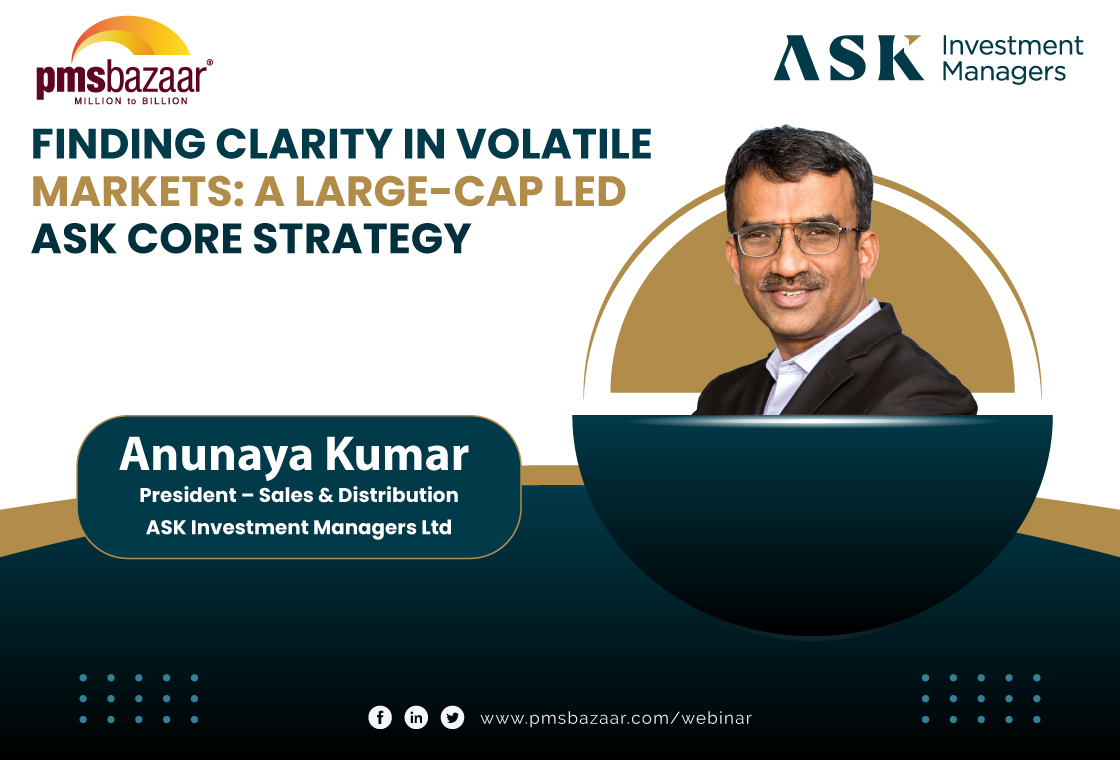India is one of the top startup centers in the world, with over 50K firms in various growth stages. In 2021, the Indian startup ecosystem was booming, with up to 42 companies becoming unicorns and 11 companies going public, providing early-stage investors with significant gains. Angel investing has become more appealing to India's HNI investors due to these changes. In this blog, we shall cover the basics of angel investing, why angel investors must invest in startups, and why an investor’s portfolio must contain stocks of startup companies funded by angel investors.

Recently we conducted a webinar on the topic – “Angel Investing: An Opportunity to Invest in Startups” with Mr. Abhay Agarwal, Founder & Fund Manager, Piper Serica Advisors as the keynote speaker. He shared some valuable insights and perspectives on Angel Investing, and this webinar blog covers the key insights shared by him.
Key insights covered in this webinar blog are:
- What is angel investing?
- Why investors must invest in startups?
- Successful startups generate high value for early-stage investors
- Indian startup ecosystem is maturing rapidly
- What is the expected return and risk from angel investing?
- What are the key success factors in angel investing?
1. What is angel investing?
Any new business goes through various stages of funding as it transitions from an idea to a successful, profitable business. The earliest stage of investment usually is from friends and families. In this stage, founders put in their own money and raise funds from families and friends to create a product or service around their idea to get early sales started. The funding stage right after this is known as angel investing.
Angel investors are early-stage private investors who invest in startups and small businesses with the potential for high returns. Given the greater risk involved in these investments at the beginning of a company, these investors typically anticipate a liberal rate of return (ROI). According to Mr. Abhay Agarwal, “In exchange for equity in the business, angel investors put their own money into start-ups or small businesses that fit certain requirements. Angel investors fund a startup when it has a minimum viable product, has few customers, generates some revenue, and demonstrate product-market fit. Funds from angel investors are used for marketing, growing sales, and product development.”
The next stage of investment after angel investing is by venture capitalists. A private equity investor known as a venture capitalist (VC) lends money to businesses with high development potential in exchange for an equity stake. This could involve providing initial capital or aiding small businesses that want to grow but lack access to equity markets. An investor who gives start-up businesses funding in exchange for equity is known as a venture capitalist (VC). New businesses frequently turn to VCs for the money they need to grow and market their products. The returns from investments are significant.
After venture capital funding, the next stage of investment is private equity funding. Private equity is a type of alternative capital that comprises money that isn't traded publicly. Private equity consists of funds and investors who make direct investments in private enterprises or who take over publicly traded companies, delisting the public equity in the process. Private equity is financed by institutional and retail investors, and the money can be used to finance innovative technology, make acquisitions, increase working capital, and strengthen and stabilize a balance sheet.
The final stage or growth stage of investment is through IPO. An initial public offering (IPO) is the procedure of issuing new shares of stock to the public for the first time in a private firm. A startup can raise equity funding from the general public through an IPO. Since there is often a share premium for present private investors, the transition from a private to a public firm can be a crucial period for private investors to completely realize rewards from their investment. Additionally, it enables public investors to take part in the sale.
2. Why investors should invest in startups?
The leverage the investors will have on the startup's system will increase. By making an investment in a company, investors can benefit greatly. They receive ownership in the business in exchange for their investment. Startups in India are expanding very quickly, and investing either individually or collectively can be more advantageous. The filing of returns entitles investors to a number of exemptions and rebates. Giving investors a three-year period of full tax exemption on startup income can result in a sizable return on their investment along with numerous other advantages of funding Indian entrepreneurs.
- To benefit from the very attractive startup opportunity in India
- A complementary addition to equity allocation for long-te0rm alpha returns
- For patient investors who are looking to build a portfolio of startup investments and are not impacted by illiquidity
- Ideal allocation of 10-20% of overall equity allocation.
According to Crossinvest Wealth, a wealth management firm in the US, $1 million portfolio investors (HNI) has an allocation of about 8-14% in private unlisted shares of funds.
3. Successful startups generate high value for early-stage investors (angel investors)
India's startup ecosystem has recently emerged as a significant growth engine for the nation and aspires to become a worldwide tech powerhouse. Many Indian startups are booming and favoring the younger generation to work and gain experience in their fields of interest. The most well-known startups in India include, among many others, Flipkart, Ola, and Zomato.
India encourages the growth of startups since it has access to competent labor at reasonable prices, investment from domestic and foreign investors, and expansion potential. The nation is now producing more unicorn startups, including businesses in health, technology, commerce, finance, and other industries.
Some examples of successful startups are
- Zomato 730x
- Flipkart – 1500x
- Ola – 1575x
- Nykaa -833x
- Freshworks- 300x
4. Indian startup ecosystem is maturing rapidly
In 2021, the Indian startup ecosystem performed remarkably well. The overwhelming increase in investor confidence in Indian businesses is evident at all stages of a startup's growth, including seed-stage investment. The entrepreneurial ecosystem is being greatly accelerated by early-stage investments in potential businesses.
These businesses are seen as viable investment choices by the different investor communities, including high net worth people (HNIs) and ultra-high net worth individuals (UHNIs). This new tendency toward early-stage startup investing being a high-return asset class can be explained by three distinct factors.
Mr. Abhay Agarwal says, “Existence of a sizable talent pool looking to launch their own business: India has realized the importance of creating innovation and incubation hubs for its sizable student population to encourage an entrepreneurial mindset through academic institutions. The entrepreneurship and early-stage startup ecosystem in India are also being driven by an increase in incubators and a steady trend among young executives toward launching their own businesses.” India's early-stage startup ecosystem is undoubtedly at an advantage thanks to the availability of young talent with the ideal combination of passion, competence, and entrepreneurial spirit, eager to capitalize on the opportunities of a booming market.
Favorable regulatory environment - By implementing progressive regulations and building necessary infrastructure, the Indian government has been a key player in promoting the establishment of early-stage businesses. In an effort to promote the involvement of early-stage potential entrepreneurs, the government has made efforts to streamline complicated legal, financial, and knowledge requirements through the Startup India Initiative, which was started in 2016. Reforms that lower the odds of establishing successful startups and support their growth include opening up industries like space technology to private investment, providing tax holidays for startups that meet certain eligibility requirements, such as annual turnover and year of incorporation, and the establishment of state-run incubators. Strategic interventions of such kind are being picked up by aspiring entrepreneurs and the results are seen in a boom in the number of early-stage startups, which is only expected to increase exponentially.
5. What is the expected return and risk from angel investing?
Cambridge Associates, a US-based Investment Advisor with over 300 billion dollars in assets conducted research for more than 2000 fund managers and 7700 funds across the public and private market investment.
The result showed that the private investment industry as a whole outperformed S&P 500 and public market funds between 1.3x to 2.2x over a 5, 10, 15, and 25-year period. Top quarter VC and early-stage investment funds outperformed S&P 500 and most public market managers by 2x to 3.1x for the same period. It is intended to target to generate 10x returns on capital over the next ten years. The biggest risk is the high mortality rate of startups. There is a lack of liquidity, unlike public market portfolios.
6. What are key success factors in angel investing?
- Quality of deal flow. Important to be part of the angel investing ecosystem.
- Ability to quickly analyze investment opportunities using an automotive predicted tool. This allows the management team to only focus on the best opportunities.
- Investing along with other experienced investors
- Staying invested for a long period of time.
- Spreading the risk over a portfolio of 30-50 investments.
- Providing health and support to portfolio companies
Mr. Abhay Agarwal covered all the above-mentioned topics in-depth and also answered some questions from the audience towards the end of the session. They also discussed in-depth Piper Serica Advisors Angel Investment Fund. For more such insights on angel investing watch the recording of this insightful session through the appended link below:
Get access to rich data and analytics of PMS & AIF by subscribing to us. Join the 40000+ investors & experts now: Subscribe NOW
Recent Blogs

Aurum Multiplier Portfolio - Where Small and Mid-Cap Alpha Meets Large-Cap Stability
PMS Bazaar recently organized a webinar titled “Aurum Multiplier Portfolio - Where Small and Mid-Cap Alpha Meets Large-Cap Stability,” which featured Mr. Sandeep Daga, MD& CIO, Nine Rivers Capital and Mr. Kunal Sabnis, Portfolio Manager, Nine Rivers Capital. This blog covers the important points shared in this insightful webinar.

Flat Markets, Wide Outcomes: How 484 PMS Strategies Performed in Dec 2025
December 2025 was a month where market returns stayed close to flat, with the Nifty 50 TRI at -0.28% and the BSE 500 TRI at -0.24%.

Equity Markets 2026: Outlook, Risks and Strategy
PMS Bazaar recently organized a webinar titled “Equity Markets 2026: Outlook, Risks and Strategy,” which featured Mr. Ashish Chaturmohta, MD & Fund Manager – APEX PMS, JM Financial Limited. This blog covers the important points shared in this insightful webinar.

MICRO CAPS: The Dark Horses of the Indian Equity Market
PMS Bazaar recently organized a webinar titled “MICRO CAPS: The Dark Horses of the Indian Equity Market,” which featured Mr. Rishi Agarwal and Mr. Adheesh Kabra, both Co-Founders and Fund Managers, Aarth AIF. This blog covers the important points shared in this insightful webinar.

Finding Clarity in Volatile Markets: A Large-Cap Led ASK CORE Strategy
PMS Bazaar recently organized a webinar titled “Finding Clarity in Volatile Markets: A Large-Cap Led ASK CORE Strategy,” which featured Mr.Anunaya Kumar, President – Sales and Distribution ASK Investment Managers Limited. This blog covers the important points shared in this insightful webinar.
.jpg)
Passively Active Investing — A Modern Investor’s Lens on ETF-Based PMS
PMS Bazaar recently organized a webinar titled “Passively Active Investing — A Modern Investor’s Lens on ETF-Based PMS,” which featured Mr. Karan Bhatia, Co-Founder and Co-Fund Manager , Pricebridge Honeycomb ETF PMs. This blog covers the important points shared in this insightful webinar.

Spot the Trouble: Red Flags in Equity Investment Analysis
PMS Bazaar recently organized a webinar titled “Spot the Trouble: Red Flags in Equity Investment Analysis,” which featured Mr. Arpit Shah, Co-Founder & Director, Care Portfolio Managers. This blog covers the important points shared in this insightful webinar.

Long-Only AIFs Rebound Sharply in October; Long-Short Strategies Lag Despite Lower Volatility
106 long-only AIFs averaged 3.68% vs 32 long-short AIFs at 2.7%; only 24–31% of funds beat key indices

